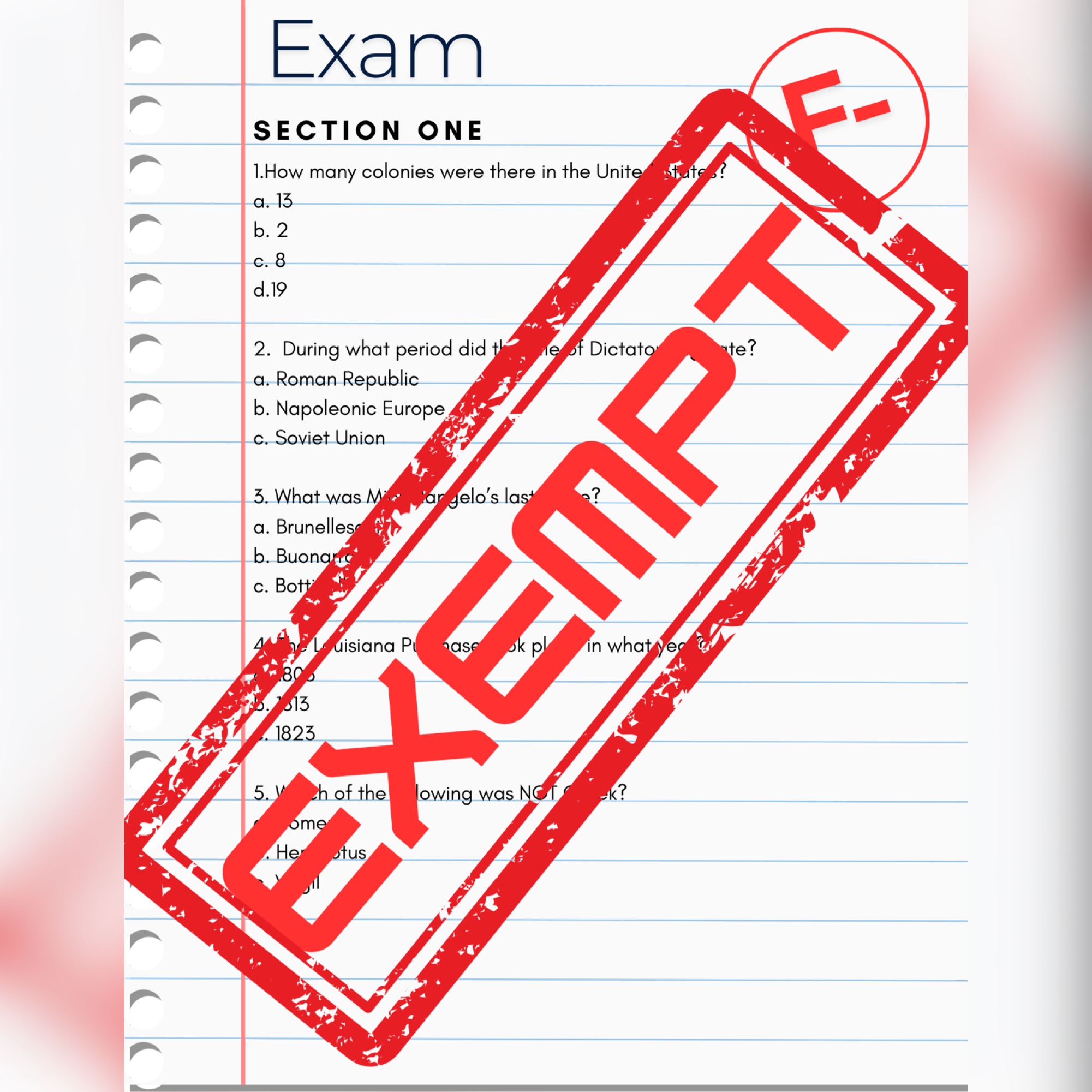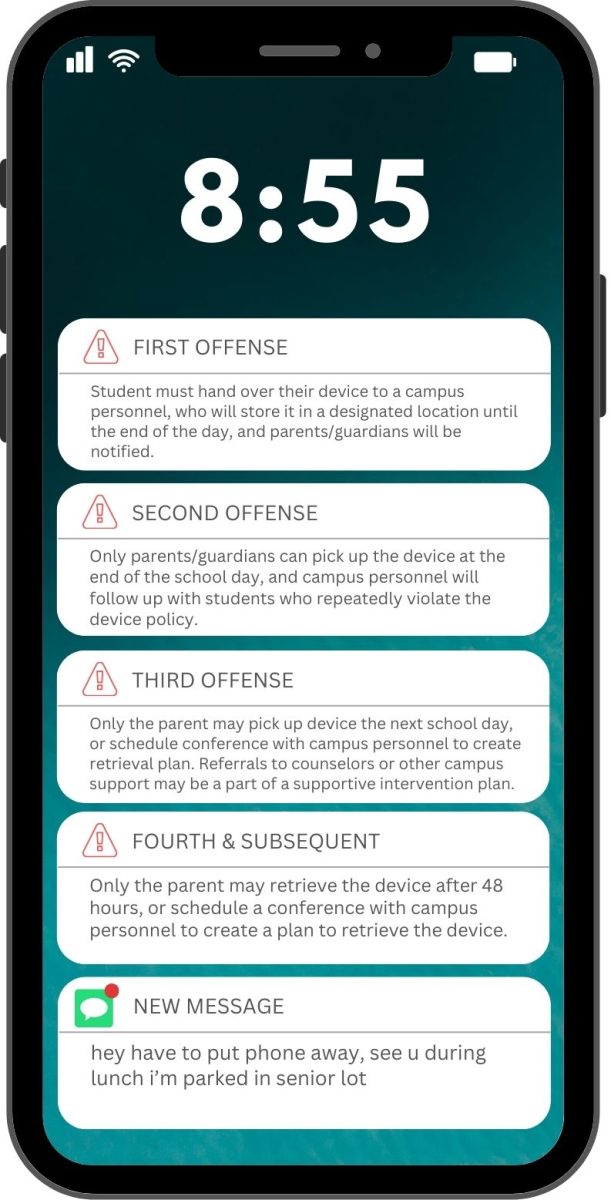After telling parents at a Campus Advisory Council and PTSA meetings on Monday that McCallum was pausing final exam incentives and not offering them this semester, principal Andy Baxa on Wednesday informed the community via email that the program would continue as is for the fall semester and with stricter student requirements to earn them in the spring.
In an interview with the Shield on Tuesday, Baxa explained his rationale for terminating the exemptions. He said the incentives aimed to improve student attendance during the pandemic but that attendance data showed that the program was not achieving its primary objective of improving attendance and ultimately student learning.
“[Final exam incentives] were introduced during COVID so that kids could feel motivated to log on,” Baxa said. “We decided to continue this plan after COVID to see if it had a positive impact on the students’ attendance and tardies, and this was not true.”
In addition to not achieving its intended results, Baxa said that he felt the incentive system undercut the school’s mission to prepare students for life after high school.
“Not having final exams kind of sets up a false narrative for students as they move forward in life after high school,” Baxa said. “In life, you don’t get to do 80% of the work and skip the last 20%.”
While Baxa still believes that the reasons for discontinuing incentives are valid, the community pushback since Monday persuaded him that it would be unfair to end the program this semester. In an email to parents on Wednesday, Baxa said the Google form to request an exemption (technically a no harm final) would be available on Blend by the end of the day on Thursday. The Google form will remain open until 5 p.m. on Tuesday.
After the meetings on Monday explaining his decision, the Shield posted a story on the MacJournalism Instagram account soliciting student opinion on the decision to end the finals incentive program. All 25 respondents to the Instagram story said they were opposed to ending the final incentive plan, and nearly half of them (48%) said they were unaware that the administration had ended the finals incentive plan until the story was posted.
One of those respondents, junior Chloe Verastagui, said in a subsequent interview with the Shield that the rationale for the final incentive plan was flawed from the beginning because it was never going to accomplish its intended goal.
“I think people are going to skip regardless of any type of bribery or policies that are put in place,” Verastegui said.
She added that she thought it was unfair for the administration to announce the removal of a policy pertaining to finals two weeks before students began testing.
“It’s upsetting because even though some people haven’t kept up their attendance, there’s a lot of people who have just to exempt a final,” Verastegui said. “There are people who are struggling and are relying on exemptions so to randomly find out so close to finals is just very annoying when you were already planning on what to exempt.”
Baxa told the Shield in an interview conducted before reinstating the final incentives that the administration was considering getting rid of the exemptions over summer break.
“It was something the administration leadership team looked at over the summer and talked about at the beginning of the year,” Baxa said.
He admitted that the administration should have communicated the change more clearly.
“I will admit that communication should have been better,” Baxa said.
Baxa initially thought the school had not communicated that incentives would be in place this year, but a parent pointed out that information about the final exam incentive was on the school website.
“At first I wondered who ever said they were going to have final exam incentives?” Baxa said. “However, after fielding emails today, a parent pointed out to me that our website still says there will be final exam incentives.”
Baxa also discovered that final incentives were a topic presented during the school’s advisory lessons.
“When I looked back on our September third advisory lesson, it left some ambiguity in there [about the final incentive program].”
After discovering this news, Baxa ultimately decided it would be unfair to go against what students were previously told throughout the year, and reinstated the final exam incentives.
“Ultimately, I had to go back on what my intentions were this semester and look back on what we publicly have posted,” Baxa said. “If we publicly posted that we will have exemptions on our website, then I have to honor that.”
While Baxa ultimately decided that it was right to reinstate the finals exemption policy, he believes the concerns that led the administration to consider pausing the policy still need to be addressed. No. 1 on that list is student attendance.
“Reviewing data, we really are not seeing a positive impact like we were hoping to see,” Baxa said. “If I do a deep dive into the statistics, pre-COVID, our chronic absentee rate was 5-8%, and now our rate is between 24-28%.”
Because the policy has not significantly improved attendance, Baxa, in an email to the Mac community on Wednesday, announced more stringent requirements for the finals incentive program in the spring semester. In order to be eligible next semester, students will have to maintain 90% attendance in all of their classes, not just the class(es) they wish to apply the incentive. Additionally, students must earn a passing grade for all grading periods in order to use the incentive for that course.
Before deciding to reinstate the incentive program, Baxa had hoped to use the semester without a finals incentive to gather data the administration could use to see if the finals incentive helped students earn higher grades.
On Ramps U.S. History and history of American music teacher Joseph Carcione told the Shield on Tuesday that he believes that the policy does make it possible for students to earn higher grades.
“I hope by offering them and having clear expectations of what it takes, students will want to show up to class more,” Carcione said. “It definitely has the potential to help.”
Because he is an OnRamps teacher, Carcione said he believes the exemptions have the ability to benefit students who take advanced classes because the incentive relieves the stress of taking eight exams; therefore, students will have more time to study for the college courses whose finals they can not exempt.
“I think that the exemptions was something you could use as an encouraging tool for students because in some classes like mine, the students have to take a UT final, so I can see how for a student, if they were able to exempt another final or two, that would allow them to dedicate more time for their mandatory UT final.”
After hearing the news that exemptions are back, students like Chloe Verastegui are happy that the administration was willing to listen and reconsider the policy based on student and parent feedback.
“I think it’s so great that exemptions are reinstated,” Verastagui said. “I know so many people like my friends that were so upset by this policy and to know that my voice and others were heard is amazing to hear.”
For his part, Baxa said he came to the conclusion that it would be best to keep the incentives the way they are, at least for this semester, because in the end that decision is what was in the best interest of students.








